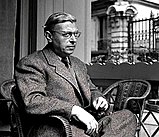
Back Eksistensialisme Afrikaans Existenzialismus ALS ኅልውነት Amharic وجودية Arabic وجوديه ARZ Esistencialismu AST Ekzistensializm Azerbaijani واراولوشچولوق AZB Экзистенциализм Bashkir Экзістэнцыялізм Byelorussian
Existentialism is a family of philosophical views and inquiry that prioritize the existence of the human individual, study existence from the individual's perspective, and conclude that, despite the absurdity or incomprehensibility of the universe, individuals must still embrace responsibility for their actions and strive to lead authentic lives.[1][2][3] In examining meaning, purpose, and value, existentialist thought often includes concepts such as existential crises, angst, courage, and freedom.[4]
Existentialism is associated with several 19th- and 20th-century European philosophers who shared an emphasis on the human subject, despite often profound differences in thought.[5][6][7] Among the 19th-century figures now associated with existentialism are philosophers Søren Kierkegaard and Friedrich Nietzsche, as well as novelist Fyodor Dostoevsky, all of whom critiqued rationalism and concerned themselves with the problem of meaning. The word existentialism, however, was not coined until the mid-20th century, during which it became most associated with contemporaneous philosophers Jean-Paul Sartre, Martin Heidegger, Simone de Beauvoir, Karl Jaspers, Gabriel Marcel, Paul Tillich, and more controversially Albert Camus.
Many existentialists considered traditional systematic or academic philosophies, in style and content, to be too abstract and removed from concrete human experience.[8][9] A primary virtue in existentialist thought is authenticity.[10] Existentialism would influence many disciplines outside of philosophy, including theology, drama, art, literature, and psychology.[11]
Existentialist philosophy encompasses a range of perspectives, but it shares certain underlying concepts. Among these, a central tenet of existentialism is that personal freedom, individual responsibility, and deliberate choice are essential to the pursuit of self-discovery and the determination of life's meaning.[12]
- ^ "existentialism". Merriam-Webster.com Dictionary. Merriam-Webster.
- ^ "existentialism". Dictionary.com Unabridged (Online). n.d.
- ^ "existentialism". Cambridge Dictionaries (Online). Cambridge University Press. n.d.
- ^ Solomon 1974, pp. 1–2.
- ^ Crowell 2020.
- ^ Macquarrie, John (1972). Existentialism. New York: Penguin. pp. 14–15.
- ^ Honderich, Ted, ed. (1995). Oxford Companion to Philosophy. New York: Oxford University Press. p. 259. ISBN 978-0-19-866132-0.
- ^ Breisach, Ernst (1962). Introduction to Modern Existentialism. New York: Grove Press. p. 5.
- ^ Kaufmann, Walter (1956). Existentialism: From Dostoyevesky to Sartre. New York: Meridian. p. 12.
- ^ Flynn 2006, p. xi.
- ^ Guignon, Charles B.; Pereboom, Derk (2001). Existentialism: Basic Writings. Hackett Publishing. p. xiii. ISBN 978-0-87220-595-6 – via Google Books.
- ^ Kleinman, Paul (2013). Philosophy 101: from Plato and Socrates to ethics and metaphysics, an essential primer on the history of thought. Adams Media. ISBN 978-1-4405-6767-4. OCLC 869368682.



